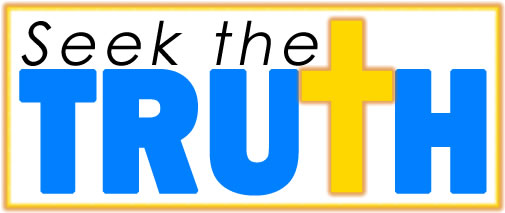- Details
- Written by: Ernie Brogdon
- Category: Articles
- Hits: 4002

Webster's 1828 Dictionary:
TRUTH, n. [Sax. treowth, truth, and troth ; G. treue ; D. getrouwheid, fidelity, from trouw, trust, faith, fidelity, whence trouwen, to marry.]
1. Conformity to fact or reality; exact accordance with that which is, or has been, or shall be. The truth of history constitutes its whole value. We rely on the truth of the scriptural prophesies.
2. True state of facts or things. The duty of a court of justice is to discover the truth. Witnesses are sworn to declare the truth, the whole truth, and nothing but the truth.
3. Conformity of words to thoughts, which is called moral truth.
4. Veracity ; purity from falsehood ; practice of speaking truth ; as when we say, a man is a man of truth.
5. Correct opinion. Harte.
6. Fidelity ; constancy.
7. Honesty ; virtue.
8. Exactness ; conformity to rule.
9. Real fact or just principle ; real state of things. There are innumerable truths with which we are not acquainted.
10. Sincerity.
11. The truth of God, is his veracity and faithfulness. Ps. lxxi.
12. Jesus Christ is called the truth. John xiv.
13. It is sometimes used by way of concession.
In truth, in reality ; in fact.
Of a truth, in reality ; certainly.
To do truth, is to practice what God commands. John iii.1
The American Heritage Dictionary of the English Language
Synonyms: These nouns refer to the quality of being in accord with fact or reality. Truth is a comprehensive term that in all of its nuances implies accuracy and honesty: "We seek the truth, and will endure the consequences" (Charles Seymour).
Veracity is adherence to the truth: "Veracity is the heart of morality" (Thomas H. Huxley).
Verity often applies to an enduring or repeatedly demonstrated truth: "beliefs that were accepted as eternal verities" (James Harvey Robinson).
Verisimilitude is the quality of having the appearance of truth or reality: "merely corroborative detail, intended to give artistic verisimilitude to an otherwise bald and unconvincing narrative" (W.S. Gilbert).2
- truth. American Dictionary of the English Language, Vol. 2. S. Converse, 1828.
- truth. Dictionary.com. The American Heritage® Dictionary of the English Language, Fourth Edition. Houghton Mifflin Company, 2004.
- Details
- Written by: Ernie Brogdon
- Category: Articles
- Hits: 4452
About Seek The Truth
Seek The Truth is a plea to society to embrace absolute truth, to the extent it can be discovered, and discern it from falsehood. What we can know and what we do know may only be a matter of learning or investigation. What we can't know, we must not proclaim to know, and what we do know, we must accept.
Perspective is not necessarily truth. If you and I witness an automobile accident between two lone drivers, there are generally five perspectives: yours, mine, each of the drivers... and the truth.
Opinion is not necessarily truth. What influences our opinions is virtually unknowable to those to whom we express it. As a result, we must view the opinions of others as simply that - opinions; even though others may emphatically insist they are telling the truth.
Multiple conflicting truths are not truth. How do we reconcile conflicting truths? Such a paradox does not pose a question for the ages, nor does it imply some sort of deep wisdom. Most likely, it's a combination of stubbornness and foolishness.
About the author
The author of Seek The Truth loves to read and write (too bad he's not much for arithmetic). He's fascinated with history and politics and considers it paramount that we recognize the limits of what we know.
His basis for truth is Holy Scripture - that found in the Bible. Now to the non-believer, this may violate everything previously stated about what truth is, but by personal experience, centuries of testimony, and observation, the author is quite secure on this point.
One must look to the deeper truths of the Bible and not get caught up in controversies. You can debate this or that all your life, and completely miss the lessons found in Scripture and lose out on the eternal lessons that can be found there.
When you watch a science fiction or fantasy movie, you need to suspend disbelief - to get rid of all doubt and embarrassment - and seek the truth of the message. The difference is that when the movie's over, you discover that nothing was real. With Scripture, you'll discover that it is real.
It's important that you learn the right lessons from Scripture, and that takes a lifetime. The author makes no claim to always being right and certainly no claim to any expertise in Scripture study or application. He's just with you on the journey, exploring and then expressing his findings, submitted for your consideration.

